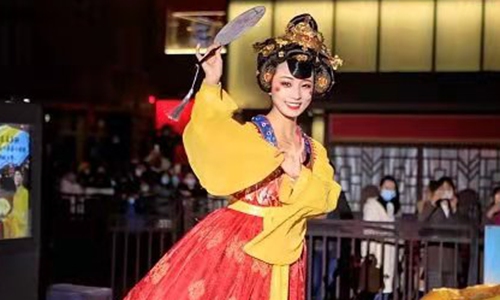
Feng Jiachen, a dancer from Xi'an in Northwest China's Shaanxi Province. Photo: Sina Weibo
Feng Jiachen, a dancer from Xi'an in Northwest China's Shaanxi Province who has risen to popularity on the internet, has recently sparked debate online about whether she should be "disqualified" from acting as a torchbearer for China's 14th National Games because she is an "internet celebrity."
Feng was a torchbearer for the Xi'an leg of the torch relay event for the 14 National Games and the 11th National Paralympic Games on Sunday.
While it is not unusual to have people from ordinary life act as torchbearers, in this case Feng's identity as a wanghong, or "online celebrity," made her a target on social media.
The news about Feng, famous for her unique roly-poly type of dancing that integrates with the cultural elements of the city as well as other aesthetic elements borrowed from Chinese history, being chosen as a torchbearer sparked netizen anger on China's Twitter-like Sina Weibo, with many saying that it is an honor that online celebrities don't deserve.
"Isn't there a standard for the torchbearer selection? Can anyone be it?" posted one netizen on Sina Weibo.
"Knowing that an online celebrity represents the face of my city makes me feel cheap. There are a lot of other excellent young people, why her?" Si Chenxi, a Xi'an citizen, opined to the Global Times on Tuesday.
Some netizens noticed that nowadays the term "online celebrity" seems to have acquired a more negative connotation to it because of the number of such influencers who promote vulgar content on the internet.
"It is more like sarcasm rather than a compliment when you call someone wanghong, because ever since their emergence, there has been a lot of shady stories attached to different groups of people with the title. When someone calls you a wanghong, they've degraded you a little bit, but having this title also allows us to make quick money, very simply," Sabrina Zhou, a well-known vlogger, told the Global Times on Tuesday.
While some netizens objected to Feng because of her status as an online celebrity, an even larger group of netizens chose to defend her, saying that people shouldn't discriminate against this title and noting that there are also hot online stars who have a positive influence on society.
"I think she is an ideal figure to take over the role. She has become a part of the scenery that attracts people to come to visit our city. I think she also helps promote local tourism," Ming, a Xi'an resident, told the Global Times.
By the way, Xi'an is also known as a wanghong. I don't mind because this means there are more opportunities to promote our local culture," added Ming.
The discussion about online celebrities comes amidst tightening regulations issued by the National Radio and Television Administration specifically rejecting online celebrities who promote a "sissy" image, show vulgar content or flaunt wealth.
"Teacher Guo," a popular online celebrity known for her ability to spit seemingly limitless vulgar words and engage in outrageous behavior, has now been "erased" from Chinese social media - for instance her account on Douyin, the China regional version of TikTok, was suspended - following the introduction of the new regulations.




